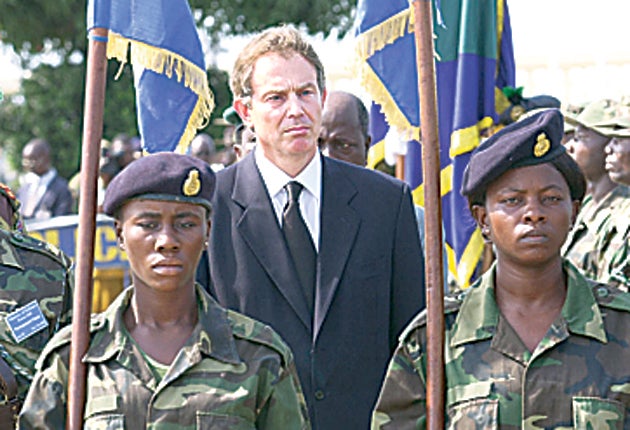Kim Sengupta: The accidental war that was a step on Blair's road to Baghdad

There are not many places in the world where Tony Blair remains popular, but Sierra Leone is an exception. In the country where his father taught law in the 1960s, the former Prime Minister receives special approbation for sending the troops which brought to an end a savage civil war.
Sierra Leone was one of "Blair's Wars", along with Kosovo and East Timor. Although it was an accidental war, (we now know the mission took place due to the determination of a British brigadier rather than any clear-cut government direction) it otherwise fitted the template: a short-term liberal intervention with a recognisable humanitarian aim and few, if any, British lives lost.
These wars allowed Blair to strut the world stage in a way that would otherwise have been difficult for the leader of a mid-level power. And one could argue that Pristina and Freetown were key steps, in how they shaped his Government's foreign policy, along the road to Baghdad.
Yet these military adventures were different to Iraq. None called for long-term commitment. Aid was delivered, small military teams stayed on, more diplomats were sent. There was no prolonged insurgency and no need for mass nation building.
And while there may have been quibbles in Whitehall about aspects of these missions, there was little strong opposition from diplomats and the military, and they all enjoyed public support – to varying degrees. All that changed with Iraq where commanders and ambassadors were expressing scepticism over the reason given for the invasion – Saddam's mythical weapons of mass destruction – as well as deep reservations about the legality of the conflict and the pitfalls of occupation.
A senior officer who had had to "steady the nerve" of Mr Blair over Kosovo and Sierra Leone found himself on the receiving end of a lecture when he attempted to question the Iraq policy in Downing Street.
Tony Blair, the victor in the little "wars of peace", now wanted to move into the big league, fully confident of his own strategic judgement.

Join our commenting forum
Join thought-provoking conversations, follow other Independent readers and see their replies